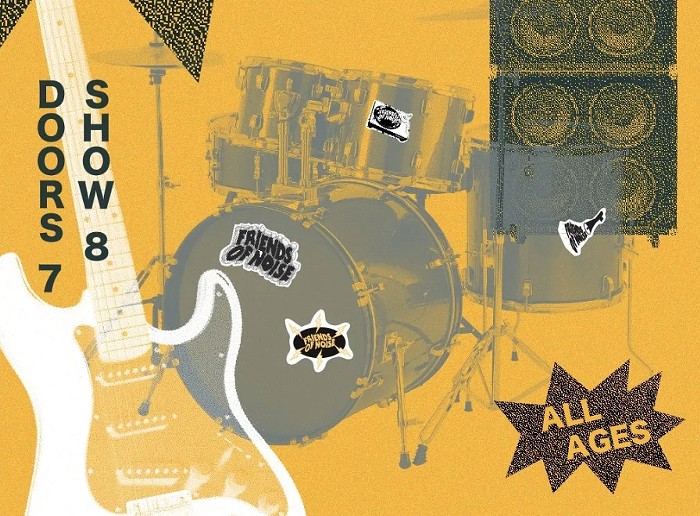THE CAREER OF M.I.A. (Mathangi "Maya" Arulpragasam) has been a copious wet dream for magazine editors, critics, bloggers, tweeters, and assorted culture vultures. With her colorful, dramatic backstory, studio savvy, predilection for confrontational imagery in her album art and videos, "exotic" good looks, and provocative way with catchphrases, this Sri Lankan/British vocalist/world-beat maven pushes more buttons than a multitasking producer on a cocaine bender.
While all of that is fairly interesting, it's been overshadowed by Lynn Hirschberg's infamous M.I.A. profile in the New York Times. Turns out that M.I.A. possesses a degree of hypocrisy (if you vow to pull up the people, you can't eat truffle-flavored fries, apparently) and her personal history may have been fudged for career-advancement purposes. Well, I never... But, what if we (mostly) ignored all of that hullabaloo and focused on M.I.A.'s music? Is that allowed?
Okay, then. M.I.A.—along with her burgeoning stable of knob-twiddlers—excels at harnessing sonic chaos and rhythmic ballistics into concise, mongrelized missiles of dance-music gunpowder. This refugee wiz's work carries a mercurial energy that makes a lot of people want to do important things—and, hey, even to dance once in a while, too.
Like Björk, M.I.A. is a chronic cool-hunter who will seemingly always have her antennae attuned to what's happening on club culture's fringes and will always manage to incorporate subterranean tropes into her own compositions. If nothing else, M.I.A. doesn't want to play it safe or plow the same path for very long.
With her newest album, Maya (/\/\/\Y/\, if you’re nasty), the media's torrid love affair with M.I.A. has cooled considerably. While 2005's Arular and 2007's Kala received 88 and 87 Metacritic ratings, respectively, Maya earned a paltry 67. This is somewhat puzzling. While Maya lacks the consistent loftiness of Kala, it does contain some catalytic bolts of brilliance.
"The Message" kicks off Maya with a rhythm akin to LCD Soundsystem's "Get Innocuous" and relates a sinister interconnectedness between humanity and technology (e.g., "Google's connected to the government"). The Rusko-produced "Steppin' Up" runs metal guitars through hellish effects over stark, brutal dubstep beats and bass augmented with a clapping, triple-time counter rhythm. M.I.A.'s autotuned voice stutters and struts in android-like boastfulness.
"XXXO" is Maya's most accessible cut, with M.I.A. crooning (ironically?) at her most seductively Madonna-esque in the chorus. It sounds like a concession to Interscope, whose corporate logo sits next to that of XL Recordings and the auteur's own N.E.E.T. imprint on the cover. "Teqkilla," is a sexily urgent shuffle shot through with a pitch-shifted dentist-drill shriek, over which M.I.A. proves she can make funny liquor-centric puns and reel off amusing double entendres. Oddly, she reveals her lighter side amid a stridently ominous backdrop.
"Lovalot" is a low-key highlight, with M.I.A. conjuring an atmospherically and rhythmically strange foundation, with a subliminal, spiritual hum accentuating the shakers, scattershot drum tattoos, and deep bass plunges. "I fight the ones that fight me" becomes both a mantra and a warning.
A three-song dull stretch ensues (the dubstep dirge "Story to Be Told," the morose skank "It Takes a Muscle," and career low "It Iz What It Iz") before the album's zenith, "Born Free," zooms into life. Producer Switch employs a honkin' sample of Suicide's pure-evil throb, "Ghost Rider," to instigate one of the most thrilling rushes of 2010. It's a 21st century "Born to Be Wild," an irrepressible bout of braggadocio: "I don't wanna talk about money coz I got it/I don't wanna talk about hoochies coz I been it." The adrenaline continues to skyrocket with "Meds and Feds" whose stomping, platform-booted beats and distorted guitar riffing (sampled from Sleigh Bells' Derek Miller), make it a nightmare mating of '70s glam and '90s gabber. Why? Why not? M.I.A. likes a risky gambit.
Maya downshifts at disc's end with "Tell Me Why," as Diplo supplies a woozy, martial lurch to M.I.A.'s winsome vocal turn and swirling Babel of background vocals, while "Space" waves goodbye with a wistful electro dub sputter.
Regardless of her current status as the fiancée of liquor empire scion Ben Bronfman (a potentially fruitful tactical move for her career and philanthropic efforts), or her rich diet, M.I.A. is a radical force in pop music. Within the context of the mainstream's airbrushed and apolitical atmosphere, her tracks barge into earshot with rude gusts of strange textures, rugged, ragged beats, and incendiary sentiments.
You can likely find contradictions and hypocrisies between/in the lives and art of John Lennon, John Lydon, Miles Davis, Kanye West, and maybe even Chuck D. Ultimately, the minutiae of musicians' personal lives fades, and what's left is the work. On that score, M.I.A. proves herself to be a cunning manipulator of agit-prop signifiers and a potential source of subversion. She's a flashy conduit for underground sounds to bubble up to the chartsville, a rare combination of coquette and rabble-rouser, a figure poised somewhere between badass '70s funkstress Betty Davis and civil-rights activist Angela Davis.



















